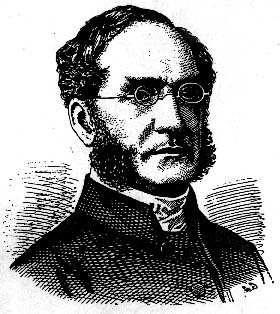[Based on the authors' "Prophecy and Anti-Popery in Victorian London: John Cumming Reconsidered," Victorian Literature and Culture 31.1 (2003): 373-389]
 From 1832 to 1879, the Rev. John Cumming (1807-1881) was the popular and influential minister of the National Scottish Church in Covent Garden. During that time, he increased the church's membership from 80 to about 900, preached to 500-600 people every Sunday, published approximately 180 books (including a volume on beekeeping), and helped operate the Brewer's-Court Ragged School in Drury Lane.
From 1832 to 1879, the Rev. John Cumming (1807-1881) was the popular and influential minister of the National Scottish Church in Covent Garden. During that time, he increased the church's membership from 80 to about 900, preached to 500-600 people every Sunday, published approximately 180 books (including a volume on beekeeping), and helped operate the Brewer's-Court Ragged School in Drury Lane.
Cumming's favorite theological topics were anti-Catholicism and apocalyptic prophecy. He crusaded against what he liked to call "Romish error" in books and pamphlets with titles like The Romish Church a Dumb Church (Arthur Hall, 1853) and Ritualism, the Highway to Rome (James Nisbet & Co., 1867); in public lectures attacking Cardinal Wiseman and John Henry Newman; and in many letters to the Times protesting the "Romish Aggression" and other perceived misdeeds of the Catholic Church.
When Cumming was not attacking Catholicism, he was interpreting Old and New Testament prophecies about the end of the world. A member of the Historicist school of prophetic interpretation, Cumming believed that history is "prophecies fulfilled" and prophecy is "histories to be fulfilled" (Destiny of Nations 5). He consequently saw passages in Daniel and Revelation played out in everything from the French Revolution to the Irish potato famine to the invention of the telegraph and steamship. Above all else, he argued that the sixth vial of judgment was poured out in 1820, the seventh followed soon after, and the Christian dispensation would come to a glorious end in or about 1867.
Victorian reactions to Cumming's views were somewhat mixed. Some of his like-minded Evangelical contemporaries commended him for his anti-Catholic stance, and the publishers' advertisements in his prophetic treatises cite favorable reviews in periodicals such as the British Banner, the Christian Guardian, and the Christian Times. He was also, however, strongly criticized for his animosity toward Rome, his apparent obsession with the end times, and his often fanciful interpretations of Scripture. Perhaps the best known attack is "Evangelical Teaching: Dr. Cumming," George Eliot's scathing condemnation of his intellectual dishonesty, anti-Catholic bigotry, and moral and spiritual perversion published in the Westminster Review in 1855.
Cumming is a difficult man to deal with today: his anti-Catholic views had fallen out of favor by the time he died, and it is tempting to relegate him to a historical dustbin along with the scores of other preachers whose end-times prophecies were consistently unfulfilled. But he is worth remembering for several reasons: he was a popular preacher in an age of great preachers, and the writing of Cumming and his critics provides a microcosm of Victorian religious discourse. If we ignore him, we ignore an important part of the landscape in which the better-remembered preachers and religious controversialists operated. He does not rank in a top tier of Victorian clergymen -- he's certainly not on a par with, say, a John Henry Newman or a C.H. Spurgeon -- but he did occupy a significant place in the history of London preaching and thus should not be overlooked.
Work Cited
Cumming, John. The Destiny of Nations as Indicated in Prophecy. London: Hurst & Blackett, 1864.
Last modified 27 August 2002
Last modified 11 April 2018